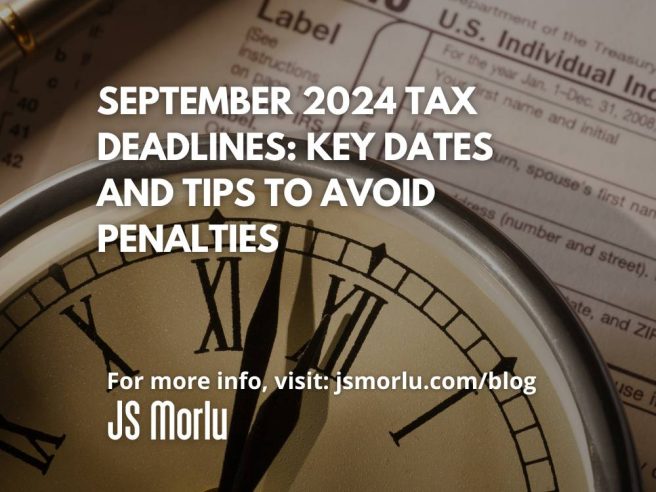As the year progresses into the fall, it’s crucial to revisit your tax planning strategies for 2024 and start preparing for 2025. September is a key month with several important tax deadlines that you should be aware of. Ensuring you meet these deadlines can help you avoid penalties and optimize your tax situation. This blog will guide you through the essential tax planning dates and actions to consider this September.
September 10 – Report Tips to Employer
If you’re an employee who receives tips as part of your income, you must report any tips exceeding $20 received in August to your employer by September 10. This requirement is fulfilled by using IRS Form 4070, which allows your employer to properly withhold FICA taxes and income tax from your regular wages.
It’s important to note that if your regular wages aren’t enough to cover the required FICA and tax withholding on these tips, your employer will record the uncollected amount in box 8 of your W-2 form for the year. This means you’ll need to pay the uncollected withholding when you file your tax return for the year. Failing to report tips accurately can result in penalties and interest, so make sure you’re diligent about reporting all your income.
September 16 – Estimated Tax Payment Due
September 16 is the deadline for the third installment of your 2024 estimated tax payments. Our tax system operates on a “pay-as-you-earn” basis, meaning taxes are due as income is earned throughout the year. The government provides several mechanisms to help taxpayers meet this requirement, including:
- Payroll withholding for employees
- Pension withholding for retirees
- Estimated tax payments for the self-employed and those with income not covered by withholding
If you don’t prepay a sufficient amount of your taxes, you could face an underpayment penalty. This penalty is calculated as the federal short-term rate plus 3 percentage points and is assessed on a quarter-by-quarter basis.
Avoiding the Underpayment Penalty
Fortunately, federal tax law provides ways to avoid the underpayment penalty. If your underpayment is less than $1,000, you won’t be penalized. Additionally, there are “safe harbor” rules that can help you avoid this penalty:
- Current Year Safe Harbor: If your estimated payments equal or exceed 90% of what you owe for the current year, you can avoid the penalty.
- Prior Year Safe Harbor: If your payments total 100% of the previous year’s tax liability, you’re also protected. However, if your adjusted gross income (AGI) exceeds $150,000 (or $75,000 for married taxpayers filing separately), the safe harbor increases to 110%.
Example: Let’s say your tax for the current year is $10,000, but you’ve only made $5,600 in prepayments. You still owe $4,400. To determine if you owe a penalty, check the first safe harbor. Since 90% of $10,000 is $9,000, and your prepayments fall short, you can’t avoid the penalty under this rule.
However, if your prior year’s tax was $5,000, and you prepaid $5,600, which is more than 110% of the prior year’s tax ($5,500), you meet the second safe harbor and can avoid the penalty.
This example highlights the importance of ensuring your prepayments are sufficient, particularly if your income has significantly increased due to events like selling stocks or property, receiving large bonuses, or retiring. Making timely payments for each estimated tax installment is crucial to qualify for the safe harbor exceptions. If you’re uncertain about your estimated tax payments or safe harbor qualifications, contact our office for guidance.
State-Specific Safe Harbor Rules
Be aware that some states have different de minimis amounts and safe harbor rules than the federal government. It’s essential to understand your state’s specific regulations to avoid any surprises. If you need clarification on your state’s requirements, reach out to our office for assistance.
Important Considerations
Weekends & Holidays: If a tax due date falls on a Saturday, Sunday, or legal holiday, the deadline is automatically extended to the next business day that isn’t a legal holiday.
Disaster Area Extensions: If you live in an area designated as a disaster zone, tax due dates may be extended. To check if your area qualifies and to learn more about the extensions, visit the following websites:
Final Thoughts
Staying on top of your tax obligations is crucial for avoiding penalties and ensuring your financial health. September brings several key deadlines that require your attention. By understanding these dates and taking the necessary actions, you can ensure a smoother tax season and set yourself up for success in the coming year.
For personalized tax planning advice and to ensure you’re making the right moves for your financial situation, don’t hesitate to schedule a consultation with our office. We’re here to help you navigate the complexities of tax planning and make informed decisions that benefit you in the long run.
JS Morlu LLC is a top-tier accounting firm based in Woodbridge, Virginia, with a team of highly experienced and qualified CPAs and business advisors. We are dedicated to providing comprehensive accounting, tax, and business advisory services to clients throughout the Washington, D.C. Metro Area and the surrounding regions. With over a decade of experience, we have cultivated a deep understanding of our clients’ needs and aspirations. We recognize that our clients seek more than just value-added accounting services; they seek a trusted partner who can guide them towards achieving their business goals and personal financial well-being.
Talk to us || What our clients says about us


